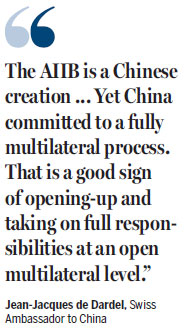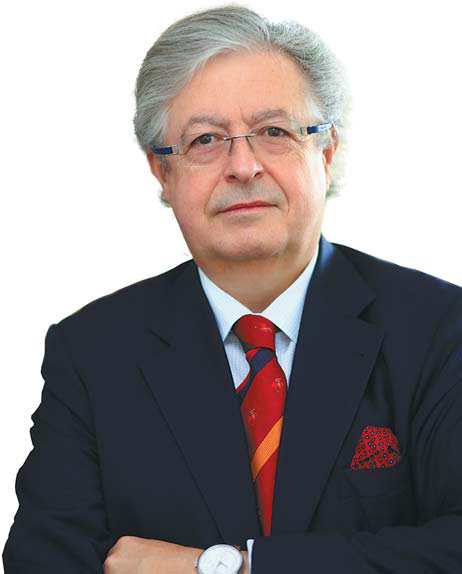2015 marks 65 years of Sino-Swiss relations
Ambassador reflects on cultural, economic, trade exchanges
Editor's note: Trade relations between China and Switzerland have undergone long-term development and cover a wide range of areas of economic and cultural cooperation. This year marks 65 years of relations between the two countries.
China has become Switzerland's largest trade partner in Asia while Switzerland has been China's first free trade partner in the world's 20 top economies and Europe since the Sino-Swiss Free Trade Agreement came into effect in July 2014.
China Daily reporter Lyu Chang held an exclusive interview with the Swiss Ambassador to China, Jean-Jacques de Dardel, who talked about the recent cultural, economic and trade exchanges between the two countries as well as his expectations for further development.
Q: What would you say has been your major achievement during your term in China?
A: I'm not sent as an ambassador for only one purpose. As a matter of fact, mine is a very broad job. So I don't consider my position here as being linked to any particular achievement. In fact, when I ponder over the matter, one thing that does come to my mind is that I took up the largest Swiss embassy we have in the world and we made it function even better and at a faster pace with twice as many events in different fields and involvements in the full Sino-Swiss relationship.
On another note, I have been working particularly on bringing Switzerland into the Asian Infrastructure Investment Bank. Our membership may not have come into reality as early as it had if this embassy had not been so actively involved in this endeavor.
In addition, a further goal of ours is to promote the creation of a renminbi hub in Switzerland. Such a hub is important for both of our countries. For Switzerland as a world financial center, we don't want to be left out of such important developments; and for China, it is good to have its currency and its economy on the world's stage using resources that our financial center may bring into force.
Stepping up cultural work is also important to me. We do that through events, which can bring more and more Chinese into our scope of action so that we can network with as many people and as many branches of society in China as possible. That means communication, public affairs and reaching out to the public through various cultural events.
Q: Switzerland has become one of the top three countries to join the China-led Asian Infrastructure Investment Bank, adding clout to an institution seen as enhancing China's regional and global influence. What is the major reason behind this?
A: The AIIB is centered on infrastructure in Asia. It just so happens that Switzerland is already highly involved in that field as it started its development-oriented aid work with Asian countries first, actually with Nepal in 1955. It could have been southern Europe because it is much closer, and it could have been South America, where we have already been highly involved with large numbers of our immigrants there. But it happened to be in Nepal because we have always had an eye towards Asia. More recently, Switzerland has got involved in the development of central Asian countries, which joined us in our constituency in the World Bank and the IMF, among other international organizations.
Q: What do you think are the benefits that will come out of the cooperation?
A: On our side we have an open and favorable political position on what the AIIB means in the way of a further opening-up of Chinese diplomacy. The AIIB is a Chinese creation, but it could have gone the other way, as China has the relations and the money and power to do that bilaterally or just regionally. Yet China committed to a fully multilateral process. That is a good sign of opening-up and taking on full responsibilities at an open multilateral level.
Q: Switzerland is known for its well-established financial system, but the country also has rich cultural diversity, warm hospitality and traditional cuisine. How do you see Swiss culture in China and are there any activities going on to promote cultural ties between China and Switzerland?
A: When mentioning culture in Switzerland, people often think about alphorns, cows and cheese or chocolate. Those are traditional elements that people associate with Switzerland, and they are indeed important, but Switzerland is actually about much more than that.
The country is full of world-class festivals and music schools such as the Verbier or the Lucerne Music Festival. Many medieval works of art in Switzerland are also the world's heritage. Swiss contemporary artists are among the world's best. I remember that in one major exhibition of world contemporary art presented a couple of years ago, in France, a good 10 percent was actually from Switzerland.
Culture is not only the painting you put on the wall or the music you listen to, but it is a way of eating and drinking and the way you raise your children. All of that is part of local community, traditions and outlooks and can be the basis for real cultural content.
We are organizing a number of cultural events here in China, for instance by inviting major symphony or chamber orchestras from Switzerland. We are also promoting as many as possible cultural exchanges in the fields of painting and photographic exhibitions.
But, one particular cultural content we want to bring to China is everything that is related to education, science, research and innovation. You may think it is more technological and linked to the economy. But as far as I am concerned, it is part of our culture, it is what makes Switzerland so successful and it is based on our system of education. It is thus also culture in a wider sense.
Q: China's anti-corruption campaign has been going on for a while, it has affected the Swiss luxury industry in a certain way. How do you see that negative impact?
A: The Swiss watch-making industry had been rising with double-digit growth for about 10 to 15 years in China, which is the world's number one market for watches. When the anti-gift-giving campaign kicked in, the expansion slowed by about 12.5 percent two or three years ago. It kept going slightly downwards the year after. But it is now slightly on the rise again, because the demand is there with more and more average Chinese being in fact quite affluent.
Contact the writer at lvchang@chinadaily.com.cn


(China Daily 11/05/2015 page7)














